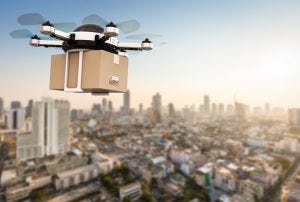
Culture Biosciences has secured $5.5 million in funding. Founded by former Google X engineers, the CDMO has harnessed drone delivery technology to support its bioreactor simulation and scale-up services.
Led by Section 32, with participation from Refactor Capital and Verily, South San Francisco, California-based firm Culture Biosciences has raised $5.5 million (€4.9 million).
The contract development and manufacturing organization (CDMO) is offering biotech firms a digital biomanufacturing platform and bioreactor facilities to run, monitor and analyze bioreactor experiments to assess scale-up strategies and overcome fermentation bottlenecks.

Culture Biosciences was founded by engineers from Google X who worked on Project Wing drone delivery project. Image: iStock/PhonlamaiPhoto
“After two years of product development and pilots, we’re ready to open up the platform,” founder and CEO Will Patrick told BioProcess Insider. “We’ll use the funding to continuing scaling out our bioreactor facility and bring on more customers.”
The firm has created a cloud-based experience for accessing and using bioreactors. “Our customers can see their data streaming live from our reactors and they get a live camera feed of each reactor” without needing to be there physically, said Patrick.
The CDMO has also built a custom bioreactor infrastructure allowing the quick scale-up of bioreactors.
“This means biopharma customers can run more bioreactor experiments during clone screening and upstream process development.” This, he continued, can save biopharma customers’ time as “instead of running multiple batches of bioreactors during process optimization, a biopharma customer could run a single batch of 24, 48, or even more bioreactors to optimize their process in a single shot.”
Google X, Project Wing
With a background in mechanical engineering, Patrick told us the CDMO’s services brings a new dynamic to the biopharma space through technology established at his previous roles at Google X, working on Project Wing to create drone delivery systems
“After Wing, I went for a graduate degree at the MIT Media Lab, where I started exploring biotechnology and realized it had some serious challenges, especially in scaling products from lab to market. One thing I recognized was that fermentation was a bottleneck. Fermentation is the key process in scale-up and was limited by speed, convenience, and flexibility.
“Although drone aircraft and automated bioreactors are quite different on the surface, there’s a lot of commonality in the technologies involved. For example, both require the development of custom electromechanical components that need feedback control – e.g. propellers and package delivery systems on drones, heating/cooling and pumping systems in bioreactors.”
Culture Biosciences has therefore been able to incorporate elements developed at Google X to its bioreactor design, for example simulation.
“We’ve built a software simulator for all of our bioreactors so we can run bioreactor processes in a simulated environment. This is quite useful – we can use the simulator to rapidly check if new recipes will perform as expected.”
Differentiators
The adoption of technologies from other sectors will be a differentiator in the industry, allowing Culture Biosciences to compete in the CDMO space.
“We leverage software and automation to provide a better customer experience, generate higher throughput data for our customers, and operate more efficiently.
“We believe we can build a better bioprocess CDMO by building our software and bioreactor infrastructure from the ground-up. We can do this because our team combines software and hardware engineering talent from Google, Facebook, and Twitter with chemical engineering and bioprocess expertise from established biotechnology companies such as Genentech and Bristol Myers Squibb.”
About the Author
You May Also Like

schedl_b_and_w.jpg?width=100&auto=webp&quality=80&disable=upscale)
schedl_b_and_w.jpg?width=400&auto=webp&quality=80&disable=upscale)



